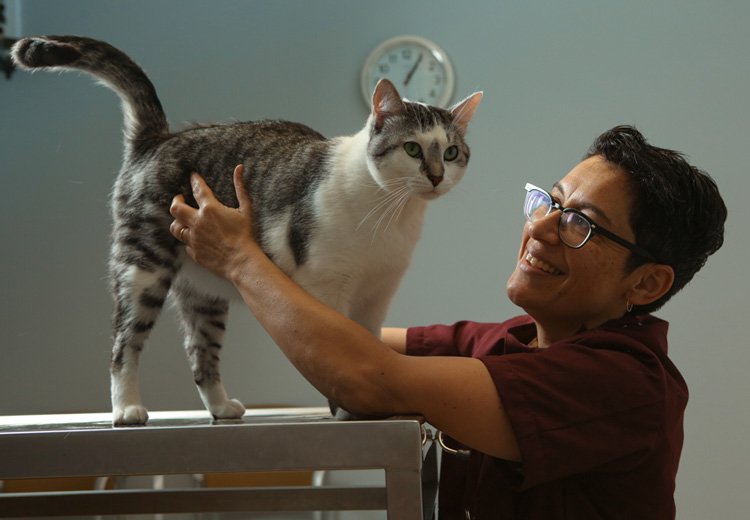First-of-its-kind CityU centre links animals and human health

From racehorses to cats, the Centre for Animal Health and Welfare seeks solutions for Hong Kong’s furry, feathered and fluffy residents
Animal welfare is human welfare, and keeping animals healthy will ultimately protect people, says Vanessa Barrs, professor of companion animal health at the Centre for Animal Health and Welfare at the City University of Hong Kong (CityU).
The centre, which is the first of its kind in Asia, recognises that human, animal and environmental health are interdependent. It has two major themes: wellness and emerging diseases.
“We hope to bring a different lens to this sort of research because people tend to be very human-centric,” Barrs says. “We hope to bring a more ‘One Health’ perspective.” CityU is committed to the One Health agenda, which acknowledges the relationships between people, animals and the environment.
“We have a diversity of projects and they all target the improvement of animal health and welfare from different angles,” Barrs explains.
For example, Rebecca Parkes, who worked as an equestrian veterinary surgeon, is studying racehorses and the effect that different racing track surfaces have on horses’ bodies and hooves. Hong Kong is a global hub of horse racing, with hundreds of horses involved in the sport, and such research has a direct impact on the well-being of horses.
The same practical application is true of Parkes’ work with donkeys. Although people around the world use donkeys to transport goods, there is no research setting a limit on the load that working donkeys can bear. “It will help to reduce injuries and safeguard the welfare of working donkeys,” says Barrs.
Barrs is part of the faculty working on emerging diseases. She focuses on companion animals, both those in shelters and pets that live with their owners.
Animal shelters are particularly important in spotting emerging disease trends. They are “a real melting pot for the emergence of diseases”, Barrs says. The centre is performing large surveys to try to characterise the prevalence of different viruses, such as feline immunodeficiency virus.
Other pathogens of interest include a flesh-eating fungus and cancer-causing viruses. Viral hepatitis is responsible for 80 per cent of liver cancers in humans. But luckily for humans, there are treatments and vaccines. The same is not true for cats, which can contract hepadnavirus, a virus that can cause liver infection and cancer, says Barrs. Researchers at the centre are developing novel blood tests to detect different stages of infection.
They are also researching zoonotic and shared-environment pathogens, which can affect humans. The centre uses next-generation sequencing to complement the research, looking at how different microbial communities within an animal interact. Researchers are also looking at animals in wet markets in China. There is strong evidence to suggest that the Covid-causing virus emerged in such a market, jumping from an animal to humans.
With its One Health agenda and the value it places on multidisciplinary research, the centre strongly encourages collaboration. “We already have a lot of multi-institutional research collaborations going on,” says Barrs. “We’re really excited about the centre and its capacity to do cutting-edge research.”

Vanessa Barrs is a registered specialist in feline medicine and chair professor of Companion Animal Health at City University of Hong Kong’s Jockey Club College of Veterinary Medicine and Life Sciences. Before moving to Hong Kong in 2019, Barrs was professor and head of small animal medicine at the University of Sydney and director of the University Veterinary Teaching Hospital in Sydney. Barrs is well known for her infectious diseases research, is former president of the International Society of Companion Animal Infectious Diseases and veterinary editor of the Journal of Clinical Microbiology. Barrs is passionate about improving animal health and welfare.
Find out more about the Centre for Animal Health and Welfare at CityU.